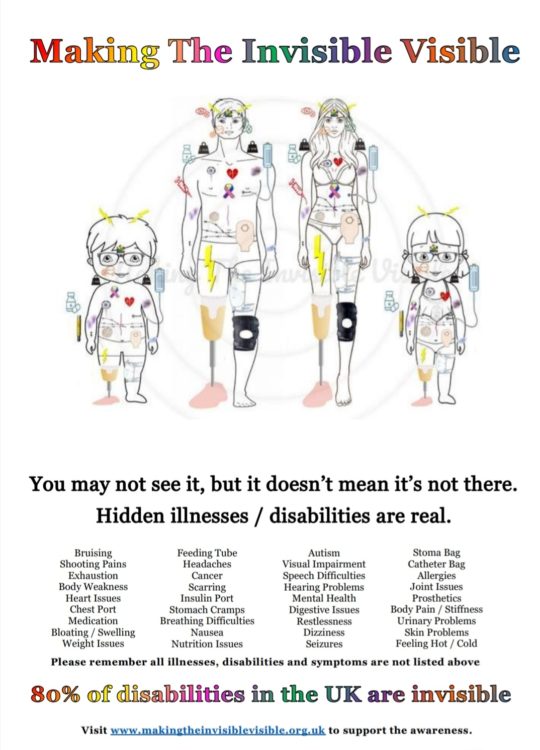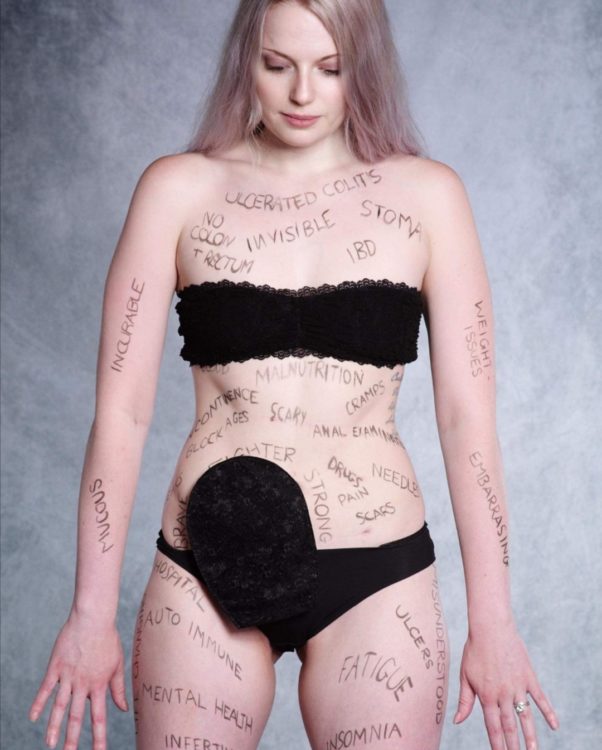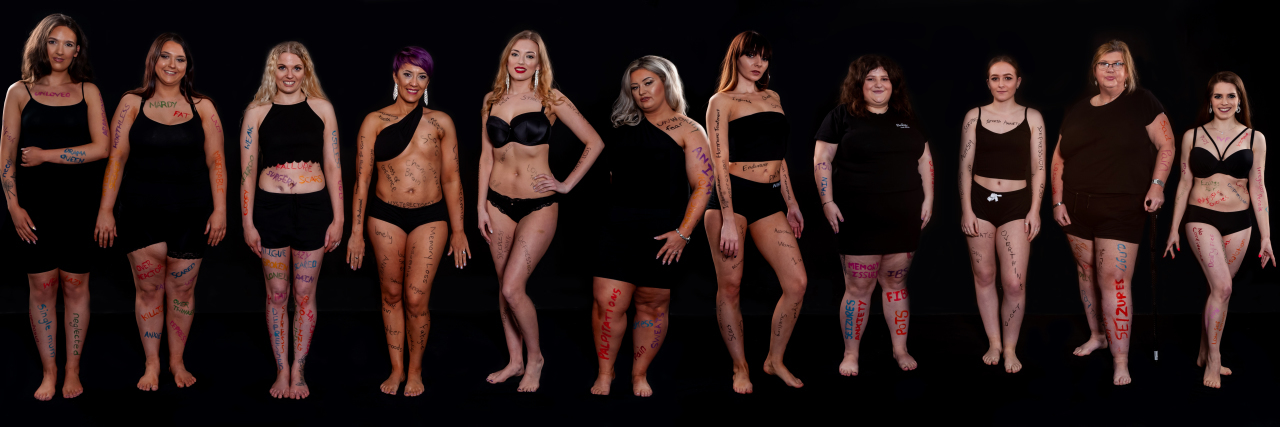Why I'm Making the Invisible Visible as Someone With Inflammatory Bowel Disease
Invisible disabilities get forgotten about so much in society, yet 80% of disabilities in the U.K. are invisible. We are just as important and just as worthy, which is why I create projects to help educate others on them to hopefully one day stop the discrimination we receive and to also empower those living with one.
I was a physically fit 24-year-old, engaged and with a successful career. I had IBS, depression, anxiety and back problems but I was still able to live a normal life without any physical difficulties. But that changed massively for me in 2017. My mom got diagnosed with lymphoma at the start of the year and it impacted my depression and anxiety. That April, my physical health started to deteriorate too, which impacted my work and social life. I couldn’t leave the house without having bowel accidents. This made me hate myself as I felt guilty for letting people down and I was getting frustrated with myself for not being able to do many everyday tasks.
I went to the doctors straight away as I knew something wasn’t right. I had IBS from childhood, but had chronic constipation, so this was a complete change in my bowel habits. Tests were completed and one came back as 2046 (calprotectin) with a normal reading being 50, so my doctors referred me to a specialist. Throughout the waiting process, my symptoms got much worse. I was going to the toilet up to 30 times a day without passing any feces (it was just pure blood and mucous) and having accidents when moving position on the sofa. It looked like a massacre and the pain was so unbearable, I would burst into tears wanting it to stop. I had actually gained 3 stone despite being unable to eat, as it caused a buildup of waste inside me, which made me feel horrendous.
I ended up being admitted into hospital in July and finally felt like things were getting resolved. I was started on treatment and stayed in hospital. I received my scope and was diagnosed with acute severe ulcerative colitis (a form of IBD) which had damaged my colon and rectum. I was treated as an urgent case and given more intense drugs, but within the same week, I was told I needed emergency stoma surgery because I was close to death. I was in complete shock. I went into hospital thinking I’d just get some medication, never did I imagine life-changing surgery. I had no time to process my diagnosis, let alone living with a stoma.
I was mortified seeing my stoma for the first time. I felt disgusting and questioned if Dale, my now-husband, would still find me attractive. Despite this, I left hospital feeling positive about getting my normal life back after surgery. I was planning to finish our wedding plans and organize our house move.
However, after my surgery, things didn’t seem to improve. I was in and out of hospital with severe bowel obstructions, which led to further emergency surgery three weeks later. My bowel had twisted which was causing abdominal pain and my stoma to pass blood. On the day of discharge, my wound burst open due to sepsis and at that point in time, I wanted my life to be over, as I couldn’t see any hope in things improving. Luckily I was allowed home on the night after some begging so I was happy, I could get back to healing in my own home.
My bowel obstructions continued so my surgeons decided a j-pouch was needed, but they held off my surgery for our wedding day. Our day was absolutely amazing although I did fall ill and left the celebrations early, but we have so many wonderful memories that we will cherish forever. Stage 2 of my j-pouch surgery went ahead in April 2018 with it taking around 8 hours and me needing a blood transfusion. Stage 3 went ahead in July 2018, which is when I said bye to my stoma, and my wound was kept open to avoid any further complications. It was strange to see it go. Despite my stomach having scars, I see my body as beautiful. I know I am worthy. My scars tell my story and remind me how strong I am.
Coming to terms with my stoma was one of my hardest mental fights. I was suicidal for the first six months, but then started to see the positives it gave. I finally saw that it didn’t change me, it made me. I have become a stronger person with everything I have been through and I’m proud of myself.
Unfortunately, my physical health is impacted by chronic fatigue syndrome, which was diagnosed as a result of my trauma, and I do still struggle with daily bowel obstructions. Although this has made me give up my successful career, I have turned my experience into a positive by raising awareness of invisible illnesses and disabilities. I have found my new purpose in life and I hold hope that one day my body will return to normal. It’s something I struggled to accept for some time, especially seeing so many successful ostomy stories. I kept wondering why I was different, but now I use my journey to help others and that’s what’s important to me.
These illnesses/disabilities drain us mentally as well as physically, so it makes it hard to deal with other people’s judgments — especially in public when we are trying to live our lives. Whilst going through my IBD journey, I had an idea to put these illnesses/disabilities into one image, with the aim to make the invisible visible by bringing it to life. So at the end of last year, I had this created in four versions, trying my best to represent as much as possible without it being overcrowded. I started using it on merchandise and posters with the aim to educate others, whilst I donate all profits to charity.

I run a private Facebook support group to help those with invisible illnesses or disabilities. It allows them to have a safe place to talk about their issues whilst getting support or advice from other members. I also run awareness interviews, where I talk to others about their journey with invisible illnesses/disabilities and use them to educate others.
Prior to COVID, I launched group photoshoots to help empower those that fight/have fought negativity to show that we are good enough despite this. This is something I created as photoshoots helped me love myself after surgery and my photos also helped others. This is currently being relaunched for those with invisible illnesses and disabilities and it is being turned into a charity calendar.

I enjoy running charity events and have raised over £2200 since June last year. Due to date changes caused by COVID, my next big one is running on February 27, which should raise over £1000 and its aim is to educate others on invisible illnesses and disabilities. Despite this being postponed, I’ve still raised £500 through virtual events during lockdown so I’m happy with what I’ve achieved.
I started competing in pageants last year as a way to show that beauty comes in all forms. I competed in Royal International Miss U.K. in February this year which gives winners the chance to compete internationally in Orlando. I came second in the role model competition and third in my division. I have decided to return to the same competition next year with the aim to win my division.
I have lots more planned in my project to raise awareness, including talks I’ve created for schools, workplaces etc. I feel it’s so important to turn our experiences into positivity and try to help people when we can. I hope my ideas successfully reduce or even end discrimination.
Learn more at Making the Invisible Visible.
Photo credit: Single-shot via Stuart Randle Photography. Group shot via Style and Story International Pageant Photography

